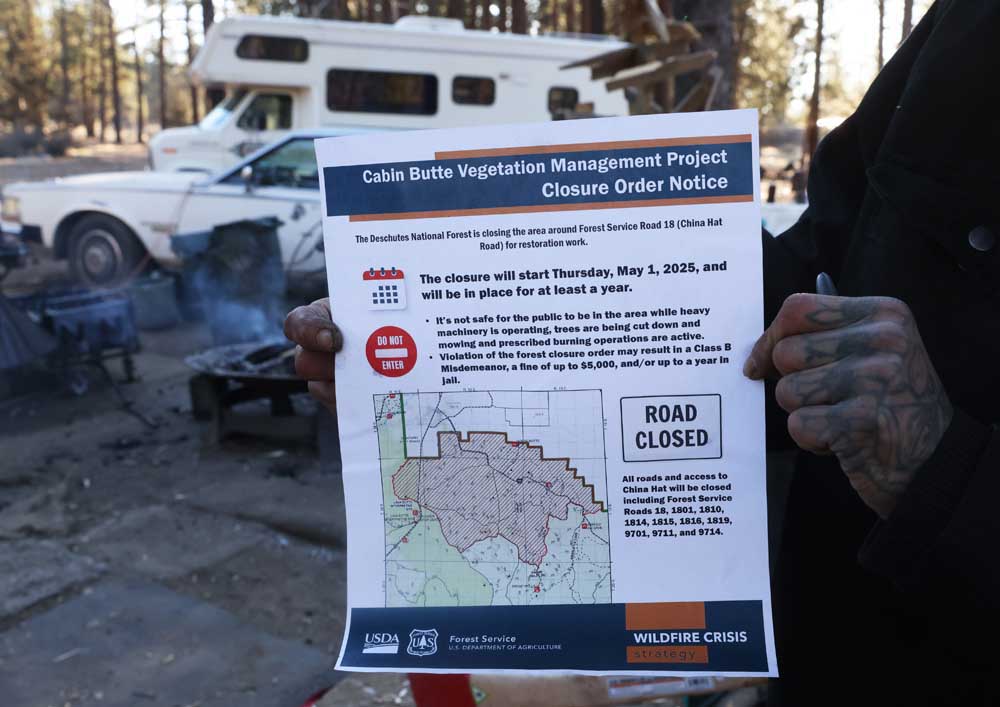Guest column: How you can help people without a home
Published 9:00 pm Thursday, February 20, 2025

- A flyer announcing road closures in the China Hat Road area near Bend.
I help deliver donated food, clothes, and propane to people living in the woods near China Hat Road. It can be wrenching, sometimes tragic, sometimes deeply satisfying. One recent week was framed by two events: Monday was with Faith; Friday was with Rachel.
Imagine the dreams a mother has when she chooses the name Faith for her newborn baby. She is not thinking about the baby girl, or the child, she is thinking about the woman she will become, about who she will be and the life she will have.
I didn’t meet Faith until she was an adult. She was not living the life of her mother’s dreams. She was living in a broken-down trailer in the woods, surrounded by dirt and trash. Every time I saw Faith she said she had been busy cleaning the place up. She had also been trying to find a way back into housing, into normal society. Most of her time was spent trying to stay warm and fed leaving little time for her long-term efforts.
On Monday, she gave up the struggle and took her own life.
Although she didn’t live in a house, Faith did have a community. All her neighbors, living in their own broken-down trailers, mourned her death. It was tragic for all of us, but for the people in her community it was also frightening. They are facing the same struggles as Faith, trying to stay warm in the winter, to eat every day, all the while trying to find a path back to a normal lifestyle, and to live in a house. Her surrender was a blow, a reminder of the possibility that their struggles may be fruitless.
On Friday of the same week, I got to help Rachel move her van from China Hat Road to an apartment she had moved to. She had been living in the woods for a couple of years, and we visited her every couple of weeks, providing a little help with food, propane, and human contact. Two weeks before, Rachel had moved into an apartment, but her van was still on China Hat, filled with her belongings: tools, household supplies, and appliances.
I could see the change in Rachel in just the two weeks of having housing. Her clothes and hair were clean and neat, but also, she was more relaxed. She looked younger. She was smiling.
It is rare and wonderful to see someone make the move from living in the dirt, constantly worrying about getting into town for propane and food, always at risk of robbery or attack, moving to live in a clean apartment, warm and safe, close to groceries and services.
The Forest Service has announced they are going to clear everyone out of the National Forest along China Hat Road soon. There is no place for them to go. People living out there can’t afford rent. There aren’t enough subsidized apartments or shelter beds for all the people living in the forest. Making them move won’t push them into the path Rachel was able to take; they would already be doing that if they could. Making them move with no place to go will only increase their struggle.
You can’t solve homelessness yourself, but you can have a significant, life-changing impact on a few people’s lives. One type of temporary housing is called safe parking; a church or a business provides a parking space or two in their parking lot for people to park their RV or trailer. All the arrangements are handled by a service organization: finding and screening clients, ensuring they keep their space clean and follow the rules, case management to help them find permanent housing, health services, etc. Ask your church or local business if they can provide a couple of spaces. When they say yes, contact REACH (reachoutcentraloregon@gmail.com) or Mountain View Community Development (info@mvcdredmond.org) for Bend or Redmond.
Do you have a point you’d like to make or an issue you feel strongly about? Submit a letter to the editor or a guest column.








